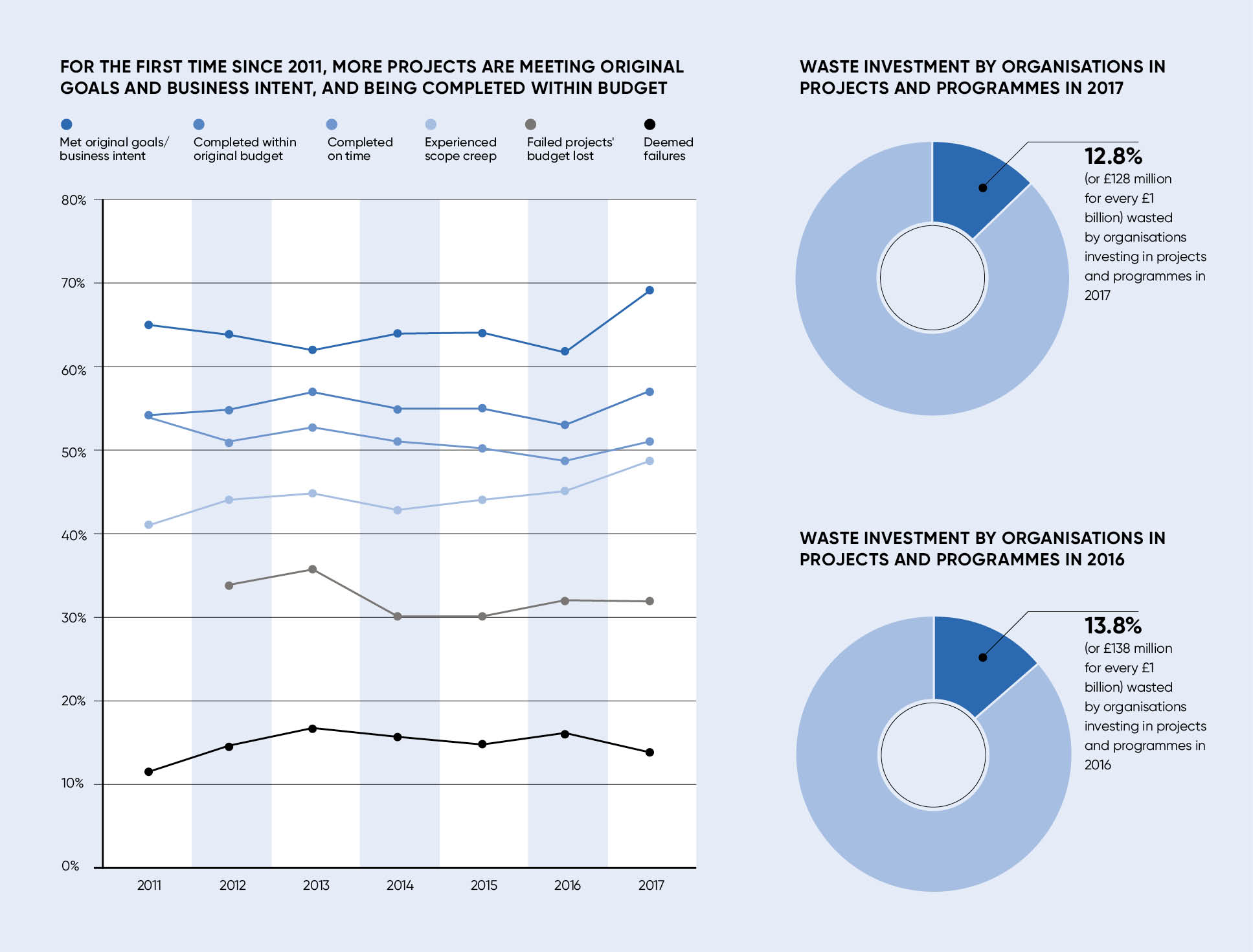 Since 2006 our Pulse of the Profession® survey has tracked the major trends for project management from around the globe. The latest research from the 2017 Pulse of the Profession®: Success Rates Rise: Transforming the High Cost of Low Performance shows that organisations in the UK are experiencing more success with implementation of their strategic initiatives – the kinds of projects and programmes that drive change, enhance competitive advantage and fuel growth.
Since 2006 our Pulse of the Profession® survey has tracked the major trends for project management from around the globe. The latest research from the 2017 Pulse of the Profession®: Success Rates Rise: Transforming the High Cost of Low Performance shows that organisations in the UK are experiencing more success with implementation of their strategic initiatives – the kinds of projects and programmes that drive change, enhance competitive advantage and fuel growth.
This year’s data specifically shows that UK organisations wasted an average of 12.8 per cent, or £128 million for every £1 billion, invested in projects and programmes, due to poor project performance. This represents a significant improvement over the previous year, when organisations wasted an average of 13.8 per cent, or £138 million for every £1 billion invested.
We have called for a shift in thinking and urged organisations to embrace project management as a strategic competency for success. The results of this year’s research suggest that organisations are listening. The report determines that these organisations generated improvement by becoming more mature with project management and distinguishing themselves by implementing several project management techniques.
LEVERAGING DELIVERY CAPABILITY
Using a project management office (PMO) as a central delivery authority can help bridge the chasm between high-level strategic vision and successful implementation. PMOs are well placed to be the conduit for executing an organisation’s portfolio of projects and strategic initiatives. The role of a PMO often includes aligning the project portfolio to strategy, monitoring progress and optimising delivery of strategy, navigating risk, driving benefits realisation, enhancing governance and accountability, and managing talent.
Eighty per cent of UK organisations had PMOs this year which is significantly more than the 71 per cent of global organisations with PMOs.
INCREASING AGILITY
To retain flexibility to respond quickly to changing market conditions, more organisations are embracing a mix of value delivery approaches, including agile methods. Seventy one per cent of organisations report they use agile approaches as part of their project management practice portfolio sometimes or more frequently.
The most forward-thinking organisations are embracing a continuum of practices that range from predictive to agile, well defined to iterative and from more to less controlled. Organisations reported that about a quarter of their projects use hybrid or customised approaches which match technique to the specific needs of the project and stakeholder group.
REALISING BENEFITS
Benefits realisation management is a powerful way to align projects, programmes and portfolios to an organisation’s overarching strategy. The concept of benefits realisation management can be broken down into three stages. The first is identification, which is determining whether the collection of strategic initiatives in the project portfolio, individually and collectively, can produce intended business results. Next comes implementation, which ensures each initiative remains aligned with the business objectives and delivers incremental value at each milestone. The final stage is sustainment through monitoring to be sure the expected value of the initiative continues even after it becomes business as usual. This year 28 per cent of UK organisations reported high benefits realisation maturity.
Laura Brock, benefits and savings lead at the UK’s Infrastructure and Projects Authority, points out: “Benefits identification helps create a shared vision, identifying key relationships between outputs, benefits and strategy. It also ensures that all benefits and possible outcomes have been considered.”
She further says the value in doing the work is “significantly increased” the earlier it is carried out. “Activities such as benefits identification workshops and benefits mapping can help predict unintended consequences that might otherwise divert progress.”
Global telecommunications company Telstra creates a “benefits profile” related to all projects and programmes at the ideation stage. The company then refines the profile as projects move through from ideation to the business case, according to Alicia Aitken, Telstra’s first chief project officer. The company also encourages continual review of potential benefits throughout the life of the project.
“Our final gate in our project governance framework is focused on a benefits realisation review,” says Ms Aitken. “This review is conducted six to twelve months after the project has been completed and is driven by our benefits management team in consultation with the business owner responsible for benefits realisation.”
The findings are then documented and presented to an executive committee with representatives from across Telstra. “The learnings from these projects are used by the committee when evaluating and providing advice on new projects to ensure Telstra is continuously improving,” Ms Aitken adds.
Organisations throughout Europe are also seeing improvements in limiting the amount of money being wasted on projects and programmes. This year’s Pulse of the Profession survey finds that European organisations wasted 13.1 per cent, or £131 million for every £1 billion invested in projects and programmes due to poor project performance. This represents a significant improvement over the previous year, when European organisations wasted 14.1 per cent, or £141 million for every £1 billion invested.
These are similar trends to the ones being played out worldwide as organisations wasted 9.7 per cent, or £97 million for every £1 billion invested in projects and programmes in 2016, compared with 12.2 per cent, or £122 million per £1 billion in the previous year. For the first time in five years, the survey also determines that more projects worldwide were found to meet original goals and business intent while being completed within budget, and fewer projects were deemed failures. Last year, organisations around the globe reduced the average amount of money they wasted on projects and programmes by 20 per cent compared with the previous year, according to the latest Pulse of the Profession.
In all, our findings continue to reinforce what we have learnt in the past that when proven project, programme and portfolio management practices are implemented, more projects are successful. Organisations regionally and worldwide are clearly making progress when it comes to completing projects on time and within budget.
We have long advocated that project management is essential for any organisation’s success. Project Management Institute research suggests that organisations in the UK are adopting this position and making significant progress as demonstrated by their improvement in implementing strategic initiatives.
For more information please visit www.pmi.org/uk

